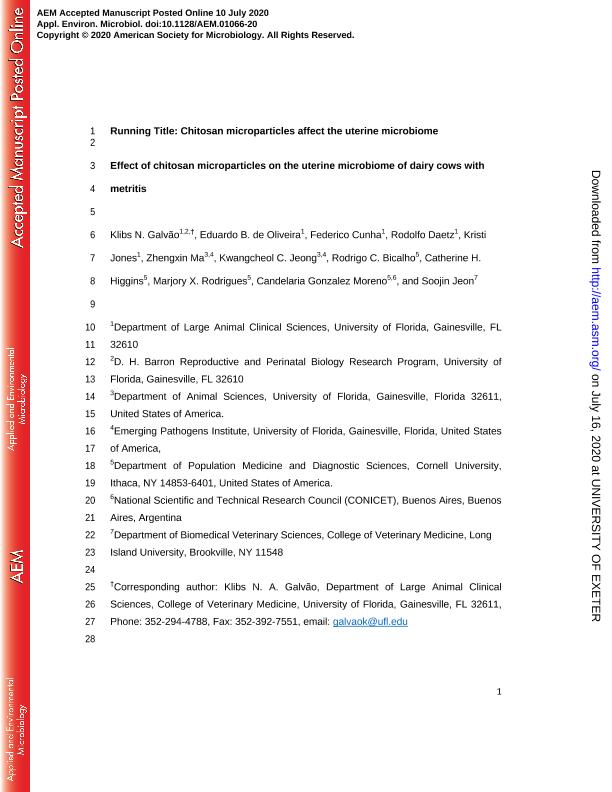Mostrar el registro sencillo del ítem
dc.contributor.author
Galvão, Klibs N.
dc.contributor.author
de Oliveira, Eduardo B.
dc.contributor.author
Cunha, Federico
dc.contributor.author
Daetz, Rodolfo
dc.contributor.author
Jones, Kristi
dc.contributor.author
Ma, Zhengxin
dc.contributor.author
Jeong, Kwangcheol C.
dc.contributor.author
Bicalho, Rodrigo C.
dc.contributor.author
Higgins, Catherine H.
dc.contributor.author
Rodrigues, Marjory X.
dc.contributor.author
Gonzalez Moreno, Candelaria

dc.contributor.author
Jeon, Soojin
dc.date.available
2023-01-10T12:28:07Z
dc.date.issued
2020-09
dc.identifier.citation
Galvão, Klibs N.; de Oliveira, Eduardo B.; Cunha, Federico; Daetz, Rodolfo; Jones, Kristi; et al.; Effect of Chitosan Microparticles on the Uterine Microbiome of Dairy Cows with Metritis; American Society for Microbiology; Applied and Environmental Microbiology; 86; 18; 9-2020; 1-36
dc.identifier.issn
0099-2240
dc.identifier.uri
http://hdl.handle.net/11336/184091
dc.description.abstract
The objective of this study was to evaluate the effect of chitosan microparticles on the uterine microbiome of cows with metritis. Dairy cows with metritis (n = 89) were assigned to 1 of 3 treatments: chitosan microparticles (n = 21), in which the cows received an intrauterine infusion of chitosan microparticles at metritis diagnosis (day 0), day 2, and day 4; ceftiofur (n = 25), in which the cows received a subcutaneous injection of ceftiofur on day 0 and day 3; and no intrauterine or subcutaneous treatment (n = 23). Nonmetritic cows (n=20) were healthy cows matched with cows with metritis by the number of days postpartum at metritis diagnosis. Uterine swab samples collected on days 0, 3, 6, 9, and 12 were used for 16S rRNA gene sequencing and 16S RNA gene copy number quantification by quantitative PCR. Principal-coordinate analysis showed that the microbiome of the ceftiofur-treated and metritic untreated groups progressed toward that of the nonmetritic group by day 3, whereas that of the chitosan microparticletreated group remained unchanged. The differences on day 3 were mainly due to a greater relative abundance of Fusobacteria, particularly Fusobacterium, in the chitosan microparticle-treated group than in the ceftiofur-treated and metritic untreated groups. Furthermore, the microbiome of the ceftiofur-treated group became similar to that of the nonmetritic group by day 9, whereas the microbiome of the chitosan microparticle-treated and metritic untreated groups became similar to that of the nonmetritic group only by day 12. The total bacterial 16S rRNA gene counts in the chitosan microparticle-treated group were greater than those in the metritic untreated controls on days 6 and 9, whereas the ceftiofur treatment group was the only group in which the total bacterial 16S rRNA gene count became similar to that in the nonmetritic group by day 12. In summary, chitosan microparticles slowed the progression of the uterine microbiome toward a healthy state, whereas ceftiofur hastened the progression toward a healthy state.
dc.format
application/pdf
dc.language.iso
eng
dc.publisher
American Society for Microbiology

dc.rights
info:eu-repo/semantics/openAccess
dc.rights.uri
https://creativecommons.org/licenses/by-nc-sa/2.5/ar/
dc.subject
CHITOSAN MICROPARTICLES
dc.subject
DAIRY COW
dc.subject
METRITIS TREATMENT
dc.subject.classification
Ciencias Veterinarias

dc.subject.classification
Ciencias Veterinarias

dc.subject.classification
CIENCIAS AGRÍCOLAS

dc.title
Effect of Chitosan Microparticles on the Uterine Microbiome of Dairy Cows with Metritis
dc.type
info:eu-repo/semantics/article
dc.type
info:ar-repo/semantics/artículo
dc.type
info:eu-repo/semantics/publishedVersion
dc.date.updated
2021-09-07T14:42:56Z
dc.journal.volume
86
dc.journal.number
18
dc.journal.pagination
1-36
dc.journal.pais
Estados Unidos

dc.journal.ciudad
Washington
dc.description.fil
Fil: Galvão, Klibs N.. University of Florida; Estados Unidos
dc.description.fil
Fil: de Oliveira, Eduardo B.. University of Florida; Estados Unidos
dc.description.fil
Fil: Cunha, Federico. University of Florida; Estados Unidos
dc.description.fil
Fil: Daetz, Rodolfo. University of Florida; Estados Unidos
dc.description.fil
Fil: Jones, Kristi. University of Florida; Estados Unidos
dc.description.fil
Fil: Ma, Zhengxin. University of Florida; Estados Unidos
dc.description.fil
Fil: Jeong, Kwangcheol C.. University of Florida; Estados Unidos
dc.description.fil
Fil: Bicalho, Rodrigo C.. Cornell University; Estados Unidos
dc.description.fil
Fil: Higgins, Catherine H.. Cornell University; Estados Unidos
dc.description.fil
Fil: Rodrigues, Marjory X.. Cornell University; Estados Unidos
dc.description.fil
Fil: Gonzalez Moreno, Candelaria. Consejo Nacional de Investigaciones Científicas y Técnicas. Centro Científico Tecnológico Conicet - Tucumán. Instituto Superior de Investigaciones Biológicas. Universidad Nacional de Tucumán. Instituto Superior de Investigaciones Biológicas; Argentina
dc.description.fil
Fil: Jeon, Soojin. Long Island University; Estados Unidos
dc.journal.title
Applied and Environmental Microbiology

dc.relation.alternativeid
info:eu-repo/semantics/altIdentifier/url/https://aem.asm.org/content/86/18/e01066-20
dc.relation.alternativeid
info:eu-repo/semantics/altIdentifier/doi/http://dx.doi.org/10.1128/AEM.01066-20
Archivos asociados
